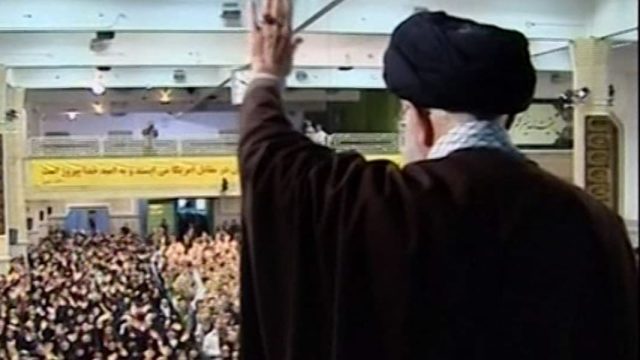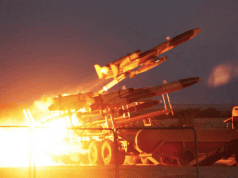By Rachel Avraham
George Orwell’s 1984, written in 1949, describes a fictional reality that takes place in 1984, 35 years after the book was published. The book describes a huge empire that controls the United States, Latin America, the British Isles, South Africa and Australia. The rule of this empire is dictatorial in the most extreme way. Their slogan was: “War is peace. Freedom is slavery. Ignorance is strength.”
The book describes “Big Brother,” the leader of the ruling party, who watches, hears, and monitors everything that the citizens do. Big Brother also controls the information that the citizens receive continuously. No scrap of information will reach a citizen before Big Brother approves it or twists it to his will and benefit. Big Brother forces the people to gather for Two Minutes of Hate, where the people rally against the enemies of Big Brother, of which the number one enemy was a Jewish man named Emmanuel Goldstein, who advocates peace with Euroasia, freedom of speech, freedom of the press, freedom of thought, and every other liberty that Big Brother despises. The government has the power to arrest any person who acts against the party or who is suspected of treason, even if there is no evidence against him. As the government monitors the routine of every citizen, a person can be arrested for even an out-of-the-ordinary smile.
It can be said that to a certain extent the book “1984” predicted the future of the country of Iran. Not only because in 1984 the country had already gone through the Islamic revolution that changed the nature of the government in the country, from a monarchical state to a theocratic dictatorial state controlled by the iron fists of the ayatollahs and the Iranian Revolutionary Guards Corp (IRGC).
Today’s Iran does not respect the most basic human rights: freedom of speech, freedom of occupation, freedom of religion, freedom of movement, and more! When you look at women’s rights in the country, the situation is much worse than the situation of the men living in the country. One of the clearest examples of the Revolutionary Guards’ disdain for Iranian women is the recent poisoning of young school age girls in Iran, merely as punishment for protesting against mandatory hijab. This is just one example of the IRGC’s attitude towards women in general. This is the starting point for women in Iran. The last wave of protests in Iran started after the Revolutionary Guards murdered Mehsa Amini because her head covering was not arranged properly and her hair was visible. To Western eyes, it seems crazy, like a fictional movie, to murder a woman because you can see the hair on her head.
The media in Iran is quite censored. Journalists living in Iran do not have the opportunity to speak openly about the government. They cannot criticize the actions of the government freely and they cannot publish what they would like. The Revolutionary Guards imposed censorship on what is happening inside Iran, befitting a typical dictatorial regime. Therefore, the only journalists who can criticize the regime and write against it are the Iranians who do not live within the borders of Iran.
For example, one of the Iranian channels that are identified as opposing the Revolutionary Guards is based in Israel (“Iran International”). But even the Iranian journalists who live outside of Iran live with a sense of threat. Just as the Iranian Octopus has arms throughout the Middle East, so the Revolutionary Guards have arms throughout the world. So even an exiled Iranian journalist who lives outside of Iran and publishes articles against the government can find his death at the hands of an assassin on behalf of Ayatollah Khamenei. In addition to this, Iran restricts the country’s Internet, so those who are inside Iran and surf the Internet are limited in the information they can get. To get around this, most Iranians change their IP address. The Revolutionary Guards even shut down the infrastructure of social networks during demonstrations against the regime, to monitor and restrict the spread of information.
Indeed, the present in Iran is not exactly rosy. Far from it. It seems that if the Ayatollahs continue to rule the country with a firm hand, the future will look less rosy and more like the reality of the book “1984”. In recent years, Iran is getting closer and closer to China, which is a dictatorship itself. For years, the Chinese have been developing surveillance technologies against the country’s citizens, such as cameras throughout the cities that record the faces of passers-by.
In addition to this, rumors are circulating around the world about the advanced Chinese technology and the dubious Chinese goals. (For example, during the COVID period, the Chinese tried to build a database of DNA samples of all the citizens of the world, with the help of the COVID tests, that made people give a saliva sample to officials in every country they entered). Just think about what this cooperation could bring about in Iran since the Chinese are already building many infrastructures throughout Iran. With the extreme religious ideology of the Revolutionary Guard, which itself managed to sweep to power in the late seventies, and with the innovative and sophisticated surveillance technology of the Chinese, the Revolutionary Guard will be “invincible”. Already these days, women who walk in an insufficiently modest manner receive an SMS to their mobile phone demanding that they tidy up their appearance. If Iran and China realize the destructive potential of their cooperation, the citizens of Iran will soon live in the reality of “1984.”
Although life in Iran does not exactly parallel the reality imagined in the book “1984”, it is not that far from it. A regime that does not give its citizens the full human rights they deserve (especially women), a regime that limits the information flowing in the country and limits the press in it is not healthy. The future of the citizens will not be better when you look at the cooperation between Iran and China these days and think about what could happen in the future. If the citizens of Iran are not to truly live in the reality of the book “1984”, they will have to renew the demonstrations against the Revolutionary Guards and expel the Ayatollahs from power in Iran.
 Rachel Avraham is a political analyst working for the Safadi Center for International Diplomacy, Research, Public Relations and Human Rights, which is run by Mendi Safadi, a former Likud Candidate for the Knesset and a former chief of staff of former Israeli Communication Minister Ayoob Kara. Since 2012, she has been working as an Israel-based journalist and writer, covering Ayatollah,
Rachel Avraham is a political analyst working for the Safadi Center for International Diplomacy, Research, Public Relations and Human Rights, which is run by Mendi Safadi, a former Likud Candidate for the Knesset and a former chief of staff of former Israeli Communication Minister Ayoob Kara. Since 2012, she has been working as an Israel-based journalist and writer, covering Ayatollah,
Daily Wire, the Christian Post, the Baltimore Jewish Times, the Jerusalem Post, Israel Hayom, Ahval and many other publications across the globe. She received her MA in Middle Eastern Studies from Ben-Gurion University. She got her BA in Government and Politics with minors in Jewish Studies and Middle Eastern Studies from the University of Maryland at College Park.





